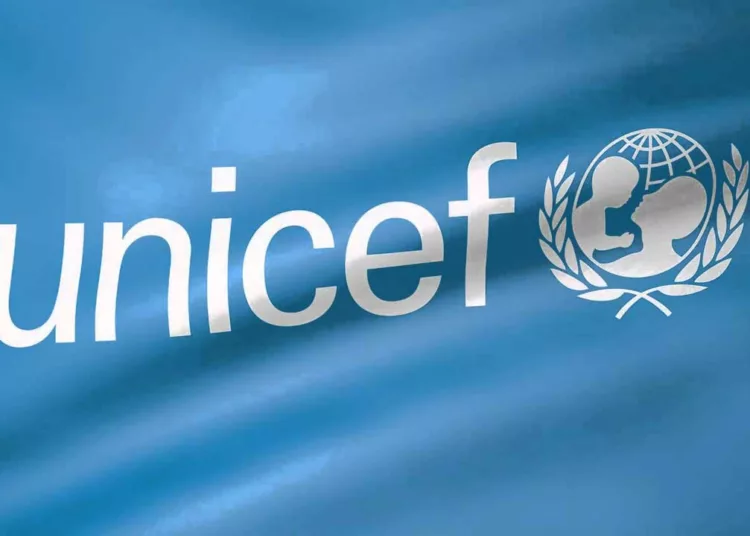The Nigerian Guild of Editors (NGE) and United Nations Children’s Fund (UNICEF) yesterday called on the Nigerian media to use its platforms and wide outreach to transform the lives of the nation’s 110 million children.
The call comes against the backdrop of alarming statistics that nearly half of all Nigerian children live in poverty, 41 out of every 1,000 newborns die before their first birthday, and 2.1 million children remain unvaccinated. Additionally, 4.9 million children are in urgent need of humanitarian assistance, while 40% of children under five are stunted due to malnutrition, and 8% suffer from wasting.
UNICEF’s representative in Nigeria, Cristian Munduate, at a symposium, themed “Reinforcing the Role of Media in Mainstreaming Child Rights,” organised by NGE, the Diamond Award for Media Excellence in collaboration with UNICEF Nigeria, yesterday, in Lagos, emphasised the transformative power of the media in influencing policy, public perception and urgent action to improve children’s lives.
“Media can drive change by keeping children’s issues at the top of the national agenda,” she said. Highlighting alarming statistics, Munduate noted that nearly half of Nigerian children live in poverty, with 67 percent experiencing multidimensional deprivations such as malnutrition, lack of education, and inadequate healthcare; additionally, 2.1 million children remain unvaccinated, 4.9 million need urgent humanitarian aid, and three out of four children in school are failing to meet basic literacy and numeracy standards.
She argued that they must move beyond reporting daily events to deliberate, sustained advocacy that holds stakeholders accountable.
“This includes the federal and state governments, religious and traditional leaders, and families. You are uniquely positioned to inform and equip these stakeholders with the tools to protect children’s rights,” Munduate stressed.
She cited past examples where media pressure influenced government action, such as stepping in to protect children from harsh judicial punishments.
She also challenged media organizations to celebrate progress and positive developments for children while maintaining a focus on the urgent need for reforms in education, healthcare, and poverty alleviation.
“Childhood is short—just 18 years. The changes we make today are the only ones that matter for these children. The media has the power to create a sense of urgency and push for the immediate actions that children cannot wait for,” she stated.
Munduate also encouraged media to foster competition among states in achieving milestones like open defecation-free status and improving access to food and education. By amplifying solutions and inspiring collaboration, the media can change the narrative for Nigeria’s children and help secure their future, she affirmed.
In the same vein, the president, NGE, Mr. Eze Anaba, called on media practitioners to take a more proactive role in advocating for the rights and well-being of Nigerian children, underscoring the urgent need to address pressing issues affecting children, including malnutrition, lack of education, and vulnerability to preventable diseases.
“Children in Nigeria are still dying from diseases that have been eradicated elsewhere or for which vaccinations are available. This situation demands a collective effort from media practitioners, health workers, policymakers, and the government to declare a state of emergency for children and place them at the forefront of national priorities,” he stated.
Anaba highlighted the stark realities facing children in Nigeria, where nearly half of the 220 million population are underage, adding that millions of children are out of school, subjected to abuse, child labor, and early marriages, while others face violence and recruitment as child combatants in conflict-affected regions.
“These statistics are not just numbers; they are stories of children whose rights are being denied and whose dreams are deferred,” Anaba lamented.
He pointed out that the symposium brought together senior government officials, media practitioners, advocates, and stakeholders, united in their commitment to creating a society where every child can thrive.
Anaba urged journalists and editors to wield their storytelling power to inspire and drive societal change.
“The media is not just a passive observer of society but an active participant in shaping norms and influencing policies. We must uncover and amplify the voices of the voiceless and pressure policymakers to act,” he stated.
He also emphasized the need for solution-based
journalism that highlights problems while exploring and advocating for remedies. Citing successful child-friendly policies and community-driven solutions.
Anaba stressed the importance of celebrating progress alongside addressing challenges. “Partnerships with organizations like UNICEF can provide data and tools to strengthen advocacy. We must commit to actionable steps, whether through investigative reports, collaborations with NGOs, or dedicated platforms for child rights,” he stated.
Anaba who quoted Nelson Mandela, saying, “There can be no keener revelation of a society’s soul than the way it treats its children,” challenged the media to become the conscience of society, using its platforms to prioritize the education, healthcare, and protection of Nigerian children.











